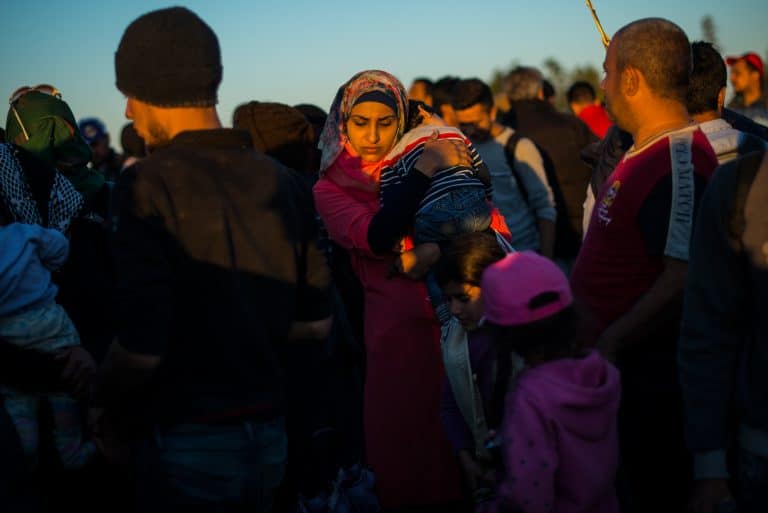
Image by David Ramos/Getty Images, © All Rights Reserved.
Mary’s Rebel Anthem
It is difficult for people who have never experienced occupation to imagine the horror of having your autonomy and the autonomy of your people lost to a foreign power; walking the streets of your village with soldiers standing at every intersection; soldiers who view your body as one of the spoils of war; soldiers who can enter your home at any moment, to do whatever they will with your God-given dignity. No move that you make goes unnoticed by the force that shouldn’t be in your neighborhood in the first place.
And thus, to read Luke — or the Bible in general, for that matter — without the lens of an occupied people is to do ourselves a great disservice. Occupation, displacement, and exile are subtexts of many a well-worn Bible story. Adam and Eve are exiled from Eden; the Israelites are enslaved in Egypt; and Mary, mother of Jesus, finds herself under Roman occupation. Therefore, for Mary to accept God’s invitation to bear Israel’s liberator is for Mary to plunge herself deeper into the burden of Roman taxation. Because not only does Mary have to worry about feeding herself, but now, a new baby.
In wise form, Mary flees her home village to be with her much older relative, Elizabeth, the pregnant cousin who is far beyond childbearing age. In a moment of incarnate poetry, Elizabeth’s baby leaps in utero, recognizing even in his mother’s womb the significance of Elizabeth and Mary’s reunion. For between those two disenfranchised, ethnic-minority women was the potential for continued resistance of the Roman Empire and the end of the world as they knew it.
The scene oozes with a sense of revolutionary urgency. Mary “goes with haste” to Elizabeth’s home; John “leaps” in utero; and Elizabeth “exclaims” Mary’s faithfulness in helping fulfill God’s promise to deliver Israel from the grip of its occupiers. Then, in a moment of clarity and lucidity, Mary voices a song that speaks of God favoring the oppressed, dethroning the powerful, elevating the lowly, and sending the wealthy away empty-handed. Mary’s song is not apolitical. It takes a side, as it were, with people like herself.
Mary articulates the hope of an oppressed people: that the world order might be turned upside down — or, depending who you ask, right side up. In the blink of an eye, Mary sings the counter-intuitive nature of God’s reign: that the wealthy are impoverished, the impoverished are wealthy, the powerless are powerful, and the powerful are powerless. In the blink of an eye, Mary goes from docile peasant girl to, in the words of Roger Wolsey, a punk rocker.
She enlists in the underground scene of Hebrew resistance, envisioning an Israel free of occupation, and ultimately, a God who keeps God’s promise of liberating God’s people. Mary’s song is no timid solo, but a loud, robust protest song. She, along with Elizabeth, is belting the first note of revolution. Which may be why her parents named her Mary (or Miriam) in the first place: a name that can be interpreted as “rebellion.” Which makes The Magnificat, as this text is traditionally called, a rebel anthem.
While Christians assemble on Sundays in white robes, amidst clean architectural lines and sanitized chalices, Mary’s firstborn was engendered in an obscure corner of the Roman Empire, among a people easily forgotten and ignored, a people wearied by military occupation and economic desolation. The way Christians begin articulating public theologies of war, occupation, and violence are at their best when they are deeply informed by the socio-political location of Mary and her fledgling family.
That nine months between Gabriel’s announcement and Jesus’ birth was one of disarming ambiguity. There was just an illiterate, unwed mother, uncertain of her and her unborn son’s future. In this way, Mary’s pregnancy isn’t much different from many of the world’s expecting parents living in occupied, war-torn territories: uncertain, risky, and anxiety-inducing. And, much like those expecting parents, Mary is able to hold onto a kernel of hope: that the fruit of her womb and rearing will become a person of history-altering proportions. And when we listen to Mary’s son, we get a sense that her rebel anthem moonlighted as Jesus’ lullaby.
